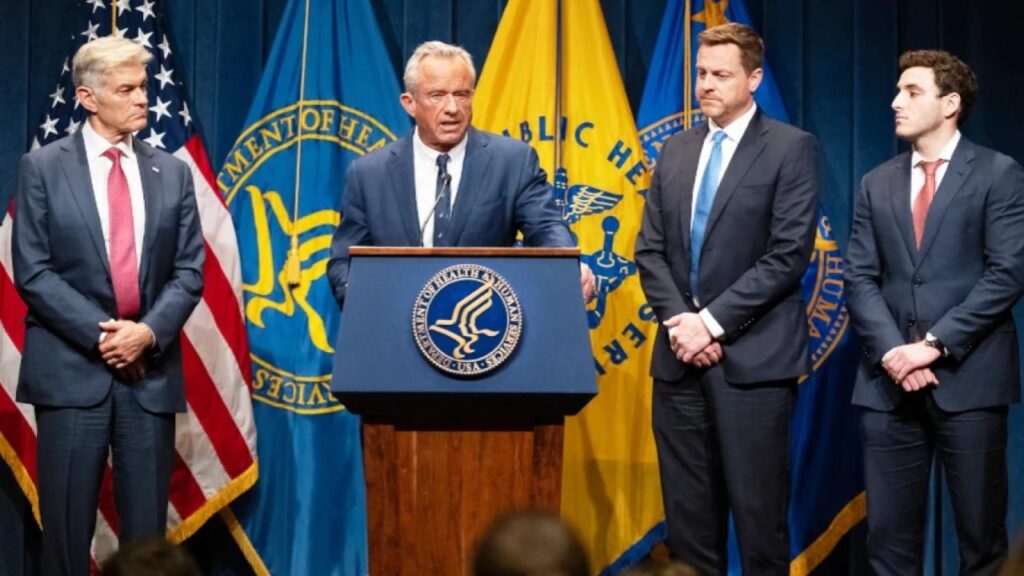In a surprising and bold move, Robert F. Kennedy Jr. and Dr. Mehmet Oz have teamed up to address one of the most persistent issues in the healthcare industry: prior authorization. This bureaucratic process, designed by insurers to control costs, often delays or denies crucial medical treatments. Now, these two prominent figures are making waves with a comprehensive reform plan aimed at holding insurers accountable and ensuring that patients receive the care they need without unnecessary hurdles.

RFK Jr. and Dr. Oz Join Forces to Force Insurers Into Action
The partnership between Robert F. Kennedy Jr. and Dr. Mehmet Oz on prior authorization reform marks a pivotal moment in the ongoing fight to improve healthcare in the United States. Their plan is a bold step toward ensuring that patients get the care they need without unnecessary delays and denials. While there are still challenges ahead, the reform could ultimately lead to a more efficient, transparent, and patient-friendly healthcare system.
As someone who’s watched the healthcare industry evolve over the years, it’s refreshing to see high-profile individuals take a stand for the patients and healthcare providers who are too often caught in the crossfire. It’s a reminder that meaningful change is possible, even in the face of powerful corporate interests.
What is Prior Authorization, and Why Does it Matter?
Before diving into the reform plan, it’s important to understand what prior authorization is and how it impacts patients. In simple terms, prior authorization is a process used by insurance companies to approve certain medical treatments, procedures, or medications before they’re provided. While the goal of prior authorization is to control healthcare costs, it often leads to delays in care, denials of necessary treatments, and unnecessary stress for both patients and healthcare providers.
For example, imagine a cancer patient who urgently needs a specific treatment that their doctor recommends. If their insurer requires prior authorization and denies it, that patient could face months of delay, or worse, be forced to seek alternatives that are less effective or more expensive. It’s a process that’s meant to control costs, but it often ends up harming patients by delaying essential care.
The Current Problem with Prior Authorization
The practice of prior authorization is nothing new, but it has become more problematic in recent years. According to the American Medical Association (AMA), more than 90% of physicians report that their patients have experienced delays in care due to prior authorization. This delay can lead to worsened health outcomes, higher overall healthcare costs, and increased administrative burdens for doctors and hospitals. In fact, a 2023 survey found that prior authorization leads to increased administrative costs of nearly $41 billion per year.
The AMA has also pointed out that over 50% of physicians report that the prior authorization process often leads to unnecessary denials of care, forcing patients to jump through additional hoops. In a world where healthcare should be patient-centered, this system seems to be anything but.
RFK Jr. and Dr. Oz: A Surprising Partnership
So, what do Robert F. Kennedy Jr. and Dr. Mehmet Oz have to do with all of this? Both are high-profile individuals with vast platforms and a long history of advocacy. RFK Jr. has long been a vocal critic of corporate interests, particularly in the healthcare and pharmaceutical industries, while Dr. Oz is well-known for his career in medicine, public health, and as a television personality.
The two may seem like unlikely allies, but they’ve found common ground on the issue of prior authorization. In fact, they have teamed up to push for major reform that would force insurers to adopt more transparent and patient-friendly policies. Their plan is designed to streamline the process, eliminate unnecessary roadblocks, and hold insurers accountable for their decisions.

The New Reform Plan: Key Takeaways
RFK Jr. and Dr. Oz’s reform proposal is sweeping, focusing on making prior authorization more efficient and equitable for all involved. Here are the main points of their plan:
- Transparency and Accountability: Insurance companies will be required to clearly disclose the criteria they use for approving or denying treatments. This will allow patients and doctors to understand exactly what’s needed for approval.
- Expedited Review Process: One of the main complaints about prior authorization is the lengthy delays. The reform plan calls for an expedited review process, especially for urgent treatments. Patients in critical conditions, like those battling cancer or chronic illnesses, will not have to wait weeks for approval.
- Appeals Process Overhaul: If a prior authorization is denied, patients and healthcare providers will have an easier and more streamlined process to appeal the decision. The current system is often bogged down by bureaucracy, which can result in patients getting lost in the shuffle.
- Independent Review Board: An independent board of medical experts will be established to review prior authorization decisions. This will ensure that insurers are not making decisions based solely on cost but are considering the medical necessity of treatments.
- Consumer Protection: Patients will be given more access to legal recourse if they are unjustly denied necessary treatments. This will give them more power in challenging decisions that could impact their health.
Why This Matters for Patients and Healthcare Providers
The new reform plan offers a much-needed solution to the ongoing problem of prior authorization. By forcing insurers to be more transparent and accountable, patients will have more access to the care they need, and doctors will spend less time navigating the red tape. The proposed expedited review process is particularly important for patients facing serious conditions, where delays in treatment could mean the difference between life and death.
Additionally, the establishment of an independent review board will help ensure that medical decisions are being made by professionals, not just based on the bottom line of insurance companies. This could lead to a more patient-centered approach to healthcare, where medical necessity is prioritized over cost-cutting measures.
For healthcare providers, this reform would eliminate some of the time-consuming administrative burdens that come with dealing with prior authorization. Physicians and hospitals would spend less time on paperwork and more time focusing on patient care.
The Public Reaction: What Are Experts Saying?
The response to RFK Jr. and Dr. Oz’s reform proposal has been largely positive. Healthcare professionals, patient advocacy groups, and lawmakers have expressed support for the plan, arguing that it’s a step in the right direction toward improving patient care. However, some insurance industry representatives have raised concerns, claiming that the changes could drive up costs for insurers, which could ultimately result in higher premiums for consumers.
Despite these concerns, many experts believe that the long-term benefits of the reform—better access to care and reduced administrative costs—will outweigh the potential drawbacks. Dr. Oz himself has emphasized the importance of putting patients first, stating that “we need to make sure that the bureaucracy is not standing in the way of life-saving treatments.”
The Road Ahead: What’s Next for Prior Authorization Reform?
While RFK Jr. and Dr. Oz’s reform plan is a significant step forward, it’s still unclear whether insurers and policymakers will fully embrace it. There will likely be a lengthy debate in Congress, and insurance companies may push back against some of the proposed changes.
That said, the momentum for reform is building. With public opinion shifting in favor of more patient-centered healthcare, it’s possible that we’ll see significant changes to the prior authorization process in the near future.






